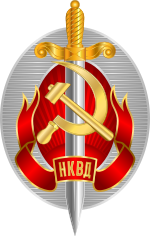People's Commissariat for Internal Affairs of the Union of Soviet Socialist Republics
More languages
More actions
The People's Commissariat for Internal Affairs of the Union of Soviet Socialist Republics (Russian: Народный комиссариат внутренних дел СССР), abbreviated as the NKVD SSSR (НКВД СССР) or just the NKVD (НКВД), was the interior ministry of the USSR from 7 December 1934 to 15 March 1945.
History[edit | edit source]
Purges[edit | edit source]
Genrikh Yagoda oversaw the trial of Zinoviev and his supporters in August 1936. Yagoda was supported by Stalin and restricted the scope of purges following the trial. Yezhov, who was more extreme, became Yagoda's second-in-command. In September 1936, following the sabotage of several Siberian mines, Yezhov became chief of the NKVD and Yagoda became People's Commissar of Communications.[1]
The NKVD began executions as part of the Great Purge in July 1937. Yezhov approved Stalin and Molotov's list of 75,950 known criminals and wreckers to be executed. In January 1938, the Central Committee released a resolution criticizing "false vigilance" that was causing excessive persecution. In the fall of 1938, Beria claimed that Yezhov was a Nazi agent who turned NKVD offices into fascist breeding grounds.[2]
References[edit | edit source]
- ↑ Ludo Martens (1996). Another View of Stalin: 'The Great Purge' (pp. 124–125). [PDF] Editions EPO. ISBN 9782872620814
- ↑ Ludo Martens (1996). Another View of Stalin: 'The Great Purge' (pp. 164–167). [PDF] Editions EPO. ISBN 9782872620814

